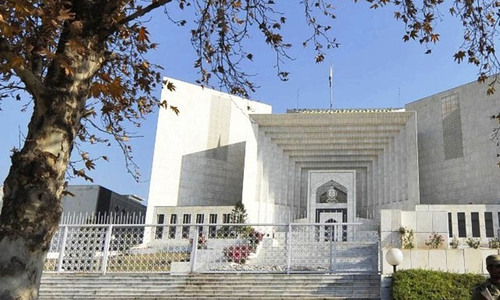ISLAMABAD: The Supreme Court on Thursday finally ordered the investing of over Rs10.6 billion collected so far in donations for the Diamer-Bhasha and Mohmand dams in the National Bank of Pakistan (NBP) for about a week.
In return the NBP has offered the interest rate of 12.6 per cent and the amount would remain parked with the bank until the auction to invest the funds in the treasury bills is finalised on June 19.
The decision was made by a five-judge bench headed by Justice Sheikh Azmat Saeed, which had taken up the case relating to the Diamer-Bhasha and Mohmand Dams Fund.
Earlier a representative of the State Bank of Pakistan had told the apex court that the next auction date for investment of the treasury bills would be June 19 after which the central bank could invest the dam funds in the treasury bills on June 20 after the court’s approval.
MNA Mohsin Dawar issued notice on petition challenging his election; Mukhtar Mai’s review petition against SC verdict dismissed on technical grounds
He had explained that the interest rate would be 12.7pc for three months, 12.8pc for six months and 13pc for one year.
The court however decided to invest the funds in the NBP till finalisation of the interest rate for investment in the treasury bills.
Mohsin Dawar
Another bench of the Supreme Court issued a notice to the PTM-backed MNA Mohsin Javed Dawar, who was elected during the last elections from constituency of NA-48 Miramshah (North Waziristan), on an election petition of Mufti Misbahuddin of the JUI-F.
Mr Dawar is behind bars for allegedly instigating an attack on an army check post in North Waziristan.
Moved through senior lawyer Kamran Murtaza, the petition says that during polling in the constituency, only 9.93pc of the votes were cast by women who were forbidden to cast votes due to threats from the supporters of Mr Dawar.
It also alleges that on polling day, the local administration had created an atmosphere of fear in the constituency with the ulterior motive to ensure Mr Dawar’s victory.
Vote counting was done in the absence of polling agents of the appellant and most of them were not allowed even to perform their duty during polling hours, the petition alleges.
Mukhtar Mai
A different bench of the Supreme Court rejected a review petition moved in the famous Mukhtar Mai gang-rape case of 2002 on the grounds that the points raised in the case could not form the basis of a review petition and that only glaring errors floating on the surface of the order could be highlighted in a review petition.
Moved through senior lawyer Barrister Aitzaz Ahsan the petition sought review of the April 21, 2011 verdict that rejected Mukhtar Mai’s appeals for enhancement of the sentence awarded to her tormentors and against acquittal of some of those who had gang-raped her.
The petition highlighted nine instances where evidence had not been noticed, saying it was enough to prove that the 2011 judgement could not be sustained as it was contrary to fundamental rules of dispensation of justice.
In August 2002, an Anti-Terrorism Court had sentenced six men to death for raping Mukhtar Mai and two others for being part of the jirga that had ordered her gang-rape. The remaining eight accused were acquitted and subsequently freed.
Later, the Lahore High Court’s Multan Bench commuted the sentence of principal accused Abdul Khaliq to life sentence and acquitted the abettors involved in the gang-rape.
The incident instantly invited criticism and had aroused international attention at that time.
Mukhtar Mai was gang-raped on June 22, 2002 on the orders of a “punchayat” (village council) convened by the influential Mastoi tribe in the southern Punjab village of Meerwala. The jirga was called to seek punishment for the then 12-year-old brother of Mukhtar Mai namely Shakoor and though it suggested that Shakoor should marry the girl with whom he was accused of having a relationship and his sister Mukhtar Mai be married to a man of Mastoi tribe, the Mastois rejected the deal and insisted that the offence of adultery should be settled with adultery.
Subsequently Mukhtar Mai was called by the council to apologise for her brother’s conduct who had already been sodomised by the Mastois. She was dragged to a nearby hut and gang-raped by four men.
But the Supreme Court, by a majority of two to one, dismissed the appeals of Mukhtar Mai though it ordered that Abdul Khaliq, the principal accused out of a total of 14 accused, would continue to serve his life sentence.
The apex court also ordered release of all accused who had been arrested because of its July 28, 2005 directives.
In her review plea Mukhtar Mai said the verdict issued by the apex court had caused miscarriage of justice since it stemmed from misreading and non-reading of material evidence on file.
Published in Dawn, June 14th, 2019













































